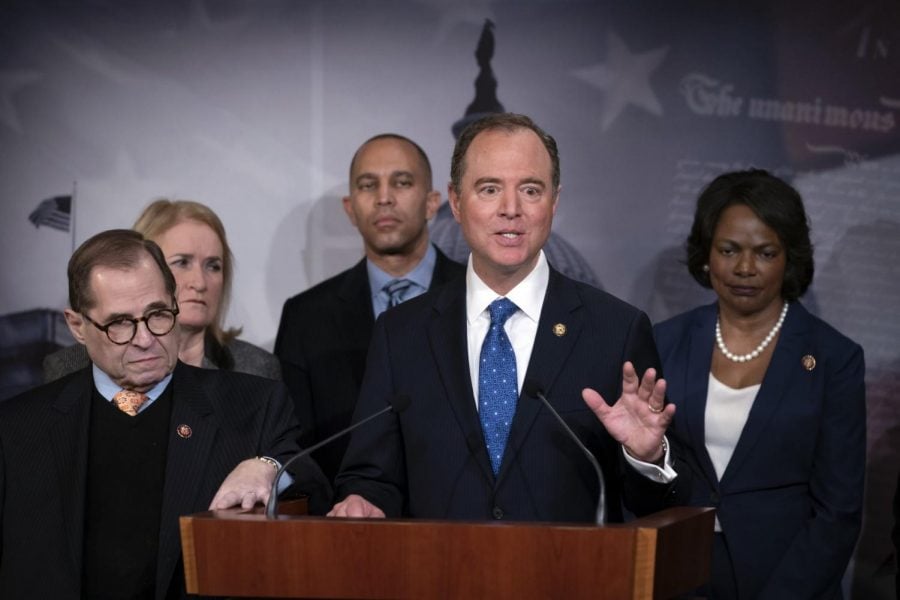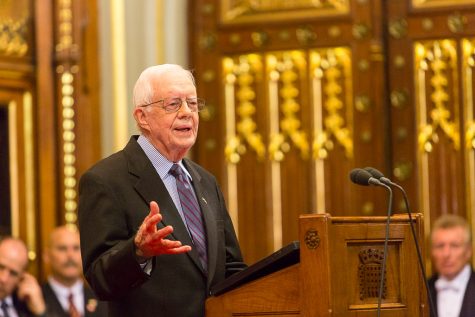Impeachment week in review
House Democratic impeachment managers, from left, House Judiciary Committee Chairman Jerrold Nadler, D-N.Y., Rep. Sylvia Garcia, D-Texas, Rep. Hakeem Jeffries, D-N.Y., House Intelligence Committee Chairman Adam Schiff, D-Calif., and Rep. Val Demings, D-Fla., speak at the Capitol in Washington, to discuss the impeachment trial of President Donald Trump on charges of abuse of power and obstruction of Congress, Saturday, Jan. 25, 2020.
The impeachment trial against President Donald Trump officially kicked off in the Senate this week, with Republicans and Democrats clashing almost every step of the way.
MONDAY, Jan. 20 – Trump’s legal team – led by Pat Cipollone – filed a legal brief that argued the two articles of impeachment against President Trump were “structurally deficient” and encouraged senators to acquit the president. The 171-page brief also accused House Democrats of trying to “interfere in the 2020 election” through their impeachment of Trump.
“Their fixation on damaging the President has trivialized the momentous act of impeachment, debased the standards of impeachable conduct, and perverted the power of impeachment by turning it into a partisan, election-year political tool,” Trump’s lawyers wrote.
Wayne Steger, a political science professor at DePaul, said disparities between the two parties are apparent as proceedings occur.
“My main thought is that this is first and foremost about political power and highlights the tremendous animus that party elites have toward each other,” Steger said. “Most of these Republican Senators believe, sincerely I think, that Democrats are brazenly attacking Trump just because they don’t like him, they don’t, and most Democrats view Republicans as poorly.”
Senate Majority Leader Mitch McConnell presented a resolution that outlined the proposed rules of the trial—after pressure from Democrats the past three weeks. Witnesses role in the trial were at the forefront of the resolution, with McConnell proposing that a decision be delayed until after opening arguments and questioning. The Senate adjourned around 10 p.m., but procedural arguments went until nearly 2 a.m.
TUESDAY, Jan. 21 – McConnell’s resolution was debated. Democrats, and some Republicans accused initial rules of attempting to “cover up” Trump’s actions and rush through the trial. Under the final resolution, defense and prosecution will have 24 hours spread across three days to present their sides. After these opening arguments, senators will have 16 hours to question the information in writing. Following the questioning – and potential witness testification – both sides will present final arguments and then a vote will occur.
Craig Sautter, a professor at DePaul’s School of Continuing and Professional Studies, said the disagreement surrounding the rules was present in the December proceedings against Trump.
“Democrats set the rules in the Impeachment proceedings in the House of Representatives, disregarding Republican complaints against ‘unfairness,’” Sautter said. “Republicans will set the rules of the trial in the Senate, disregarding Democrat complaints against ‘unfairness.’”
A subpoena of the White House’s “emails, memos and other documents related to President Trump’s pressure campaign on Ukraine” was blocked in a 53-47 vote, citing that it was the House’s “responsibility” to obtain all evidence before passing along the articles of impeachment to the Senate.
WEDNESDAY, Jan. 22 – Trial rules were approved in a 53-47 vote. Senate Minority Leader Chuck Schumer proposed 11 amendments to the resolution, but the same party-line vote rejected them. Schumer attempted to subpoena records from the White House, State Department, Defense Department, acting White House Chief of Staff Mick Mulvaney, Mulvaney’s senior advisor Robert Blair, Michael Duffy and former National Security Advisor John Bolton.
Arguments from the House of Representatives prosecutors began. In Rep. Adam Schiff’s opening statement, the lead prosecutor spoke about how accountability for future leaders will be impacted if Trump is acquitted.
“If not remedied by his conviction in the Senate and removal from office, President Trump’s abuse of his office and obstruction of Congress will permanently alter the balance of power among our branches of government, inviting future presidents to operate as if they too are also beyond the reach of accountability, congressional oversight and the law,” he said.
Deliberations were briefly interrupted when a protestor caused an outburst in the visitor gallery as Rep. Hakeem Jeffries (D-NY) presented evidence against Trump. The individual – described as an older man with gray hair – shouted “dismiss the charges” as he was led away in handcuffs by police.
THURSDAY, Jan. 23 – The charge accusing Trump of abuse of power was the focus of Thursday’s proceedings. For the most part, Schiff’s argument recounted evidence already presented in the House’s impeachment proceedings against the president. Schiff summarized the conduct between Trump and Zelensky during “three days in July.”
“And then the third day in a row in July, President Trump sought to ensure that Ukraine had received his request and understood it and would take the necessary steps to announce the investigations that he wanted. Three days in July,” he said.
Trump’s knowledge of the communications with Ukraine was emphasized by Rep. Val Demings (D-FL) while Rep. Zoe Lofgren (D-CA) recounted the General Accountability Office report that found the U.S. violated the law when military aid to Ukraine was withheld.
“He could release the aid or break the law. He chose to break the law,” she said.
FRIDAY, Jan. 24 – Obstruction of Congress was the focus of the House’s arguments as prosecutors wrapped up their opening remarks. House manager Jerry Nadler finished his statements with some of the harshest language towards Trump yet.
“He is a dictator,” Nadler said. “This must not stand, and that is why another reason he must be removed from office.”
Schumer and Schiff pushed for a witness vote once again, with Schiff pleading for Senators to “give America a fair trial.”
“Americans get a fair trial. And so I ask you, I implore you, give America a fair trial. Give America a fair trial. She’s worth it,” he said.
SATURDAY, Jan. 25 – In the shortest session thus far – lasting just two hours – Trump’s legal team began their opening arguments. Cipollone maintained the stance that “the president did nothing wrong” while repeating information filed in Monday’s brief as he emphasized beliefs that the electoral process is at the heart of the charges.
“They’re asking you not only to overturn the results of the last election, but as I’ve said before, they’re asking you to remove President Trump from the ballot in an election that’s occurring in approximately nine months,” Cipollone said. “They’re asking you to tear up all of the ballots across this country on your own initiative, take that decision away from the American people.”
THE WEEK AHEAD: Opening arguments from Trump’s legal team will continue Monday. Following these statements, the 16-hour period for written questioning will begin for Senators.












